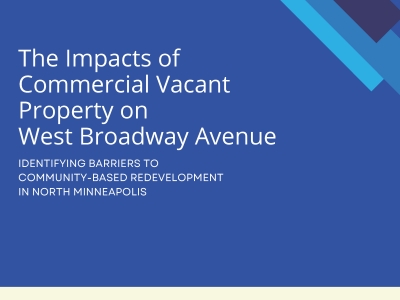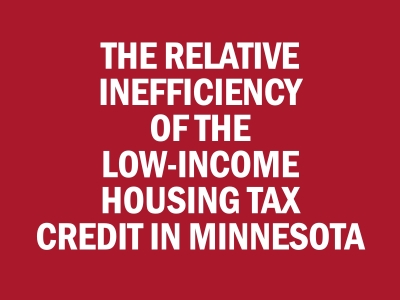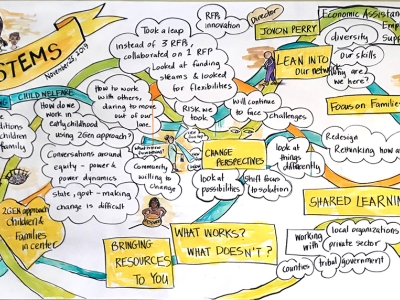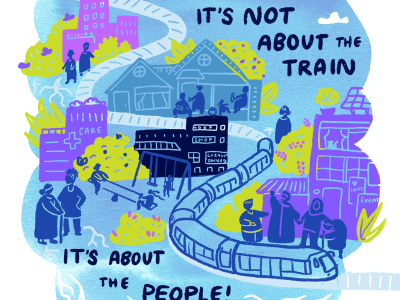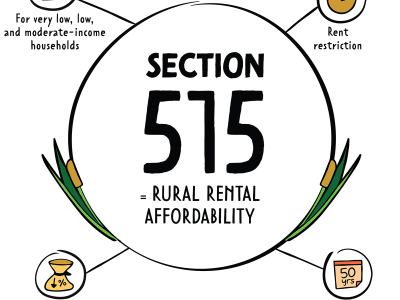Excerpted from Local Data for Equitable Communities Resource Hub, a publication of NNIP…
Research
The Center for Urban and Regional Affairs’ most recent CURA-, faculty-, and graduate student-led research projects
The City of Minneapolis faces a growing issue with vacant, abandoned, and deteriorated properties, particularly in areas like North Minneapolis. The City has committed to getting these properties back into functional usage, and in partnership with the Center for Urban and Regional Affairs’ (CURA) Kris Nelson Program, the North Minneapolis Promise Zone analyzed the City’s redevelopment process. Through a case-study and survey of West Broadway Avenue in North Minneapolis, it was found that numerous properties in the vicinity have…
Executive Summary
The Low-Income Housing Tax Credit (LIHTC) is less efficient with public subsidies than other subsidized housing development programs in the State of Minnesota. Public subsidy is lost at the very beginning of tax credit deals when developers must sell the credits to investors. Historically, the market has resulted in credits being sold for 87 cents on the dollar, a loss of 13% in the value of the credit at the outset. We are unable to estimate the full cost in dollars of this leakage due to lack of data. Second, administrative costs are higher for tax credit projects than for non-LIHTC projects. We estimate a cost of up to $1.…
By Samuel David, Department of Curriculum and Instruction at the College of Education and Human Development, and Mabindra Regmi, graduate research assistant
Introduction
Welcome to the next online-exclusive edition of the CURA Reporter. Learn more about the CURA Reporter and subscribe.People are on the move. The forces of global commerce and connectivity have conspired with the disruptions of conflict…
Renewing the Countryside is a nonprofit organization that strengthens rural areas by championing and supporting rural communities, farmers, artists, entrepreneurs, educators, activists and other people who are renewing the countryside through sustainable and innovative initiatives, businesses, and projects.
In 2022-23, CURA partnered with Renewing the Countryside and a student researcher to study agricultural easements as a policy tool to preserve agricultural land in Minnesota. Agricultural easements protect the long-term viability of the nation’s food supply by preventing conversion of productive working…
Introduction
Welcome to the next online-exclusive edition of the CURA Reporter. Learn more about the CURA Reporter and subscribe.Sitting around six tables in a bright room, about forty-five civil servants from the Minnesota’s Department of Human Services joined a day-long planning session of a new policy initiative that aims at advancing two-generation approaches that improve outcomes for children and parents altogether — the Minnesota 2-Generation Policy Network. Some of the participants were apprehensive as they often…
Community Based Research Graduate Student Project Spotlight
Fact sheet: Housing and Race in Minneapolis
Through the Kris Nelson Community-Based Research Program, Jack Gramlich (MPP '24) has supported the research and advocacy goals of the Make Homes Happen Coalition over the last year. Together, Jack and his community partner worked to produce a fact sheet that visualizes key insights on racial disparities in the Minneapolis housing market, which supports the project's broader research goal of evaluating the City's progress on meeting its housing goals.
My community partner, the Make Homes Happen Coalition, focuses on racial disparities in the…
The Blue Line Extension Anti-displacement Executive Summary is now available! The Blue Line Extension has been in the works for over a decade. For at least that long, corridor communities have been challenging governments and private sector actors to be considerate of the local population to ensure that they are not displaced as a result of development. In response to these concerns and to ensure the Blue Line Extension transit investment benefits current corridor residents and businesses, Hennepin County and the Metropolitan Council initiated an anti displacement initiative and contracted with the University of Minnesota’s Center for Urban and Regional Affairs (CURA) to work…

